We often get emails that make us smile. This one from physician colleague Dr Jacob Hofer caught me by surprise in early November.
Good Morning Mark,
I thought you might be interested. . . our cross country team won the class C sectional race (see below) and will be going to the state championship next Saturday. We have mandated that all training takes place in barefoot shoes (Merrell Trail Glove or Bare Access) and have had no injuries this season to date, with the exception of two mild muscle strains which healed quickly without difficulty. To my knowledge, we are the only high school cross country team in the country that makes barefoot shoes a requirement. We expect to be in the top 3 in the state in class C, but we will see how it goes. Have a great week! Jake
http://www.dailyfreeman.com/article/DF/20171103/SPORTS/171109879
……………………
And the follow up with the State meet result:
Good Morning Mark,
The Mount Academy cross country team ran a strong race on Saturday and won the class C title here in New York! As I mentioned to you previously, this is the first year that our coaches have required barefoot shoes for all training (specifically Merrell Trail Glove and Bare Access). Aside from our lead runner Travis, who has been training in Trail Gloves since 7th grade, all the runners on our varsity team had to transition from conventional running shoes into the Merrell shoes mentioned above during the off-season. I was expecting to see some foot issues as we made this transition, but there were none. The fact that our team was able to make this transition without injury is perhaps the most important thing we learned this year.
The reason I advised the coaches to make this requirement was because I noticed a lot of our runners were running with incorrect technique. Specifically, many were quad dominant, and I felt that avoidance of conventional shoes would likely preserve natural form, which would improve performance and reduce the risk of injury. Our quad dominant runners have not magically converted to glute dominant runners with the introduction of these shoes, but none of them got hurt, and their performance this season was excellent. Because all our kids and younger runners are training exclusively in barefoot shoes, our prediction is that our entire cross country team will be running naturally within 2-3 years, but it is too early to tell.
This change in footwear has been accompanied by a drastic change in how we train our runners, where they spend most of their time training slowly, building up a big aerobic base, and speed is only introduced later. These changes were largely fueled by your running conference in Chester, CT 2 + years ago. Thanks Mark! You definitely deserve some credit for the Mount’s victory
Jake
So I finally caught up with Jake for some Q and A:
Tell us a little of your background as a runner?
I began running recreationally when I was a senior in high school. My normal workout was a 3 mile run, and I would do that roughly 3 times weekly. I have rarely competed in races, and have never gotten very fast, but enjoy it immensely, which is why I continue to do it.
Did you have significant injuries in your running experience?
I had knee pain from running for years, which I thought was a normal consequence of “pounding the asphalt”. The pain was so significant that I started taking an NSAID on a regular basis to help keep it in check. My first significant running injury occurred in 2013. I went out for a slightly longer run than normal (6 miles) and developed pain in one of my Achilles tendons. I rested for several days, attempted another run, and the pain became so severe that I had to stop running and came limping home. It was at that point that I realized there was a more serious problem, and I wasn’t able to start running for almost 4 months.
It was at this time that I was introduced to the book Born To Run. In addition to my Achilles tendon injury, I was in constant daily foot pain which 3 foot specialists, each with their own version of a custom orthotic, had been unsuccessful in treating. The story goes as follows. A friend of mine who knew a lot about the harmful effects of conventional footwear had been trying unsuccessfully to convince me to introduce these concepts into my medical practice. Because he had no medical training, I didn’t take him seriously, but he was so serious in his attempts that he signed out Born To Run from the local public library and hand-delivered it to my house. It sat around the house for several days (as I had no interest in reading it) and my wife picked it up and started reading it. After several chapters she told me “Jake, you are exactly like Chris McDougall.” At that point I picked up the book, read it, and absorbed it.
After recuperating from my injury, I started running again, splitting my time between running barefoot or running in minimalist shoes. I read several books on the subject, and thought I was doing it correctly, but felt like I lacked speed and power. In addition, every time my wife saw me running she would laugh and say “you look like a prancing horse”. In the summer of 2015 I attended one of your “Healthy Running” seminars, and after hearing some of your constructive criticism and spending some time on the TrueForm trainers, I sorted out the problem and rediscovered the natural form that I must have had as a child.
I gradually increased my mileage up to 20-25 miles weekly, and my main challenge has been not to advance my speed or distance too fast. I have not been completely without problems (have had to stop running for short periods of time on several occasions for some minor issues) but on the whole running has been fun, effortless, and pain free. I no longer take NSAIDS for knee pain, as the pain has completely resolved.
What drove you to go to medical school?
The reason I went to medical school was because the Church that I am from was looking for someone to train as a physician and join the medical practice that looks after the members of the Church. When they approached me about it, I accepted the opportunity and have found it a most rewarding vocation.
What type of medical practice do you have now?
I am currently working in a family medicine group practice that provides medical care for our community which is the religious order that I belong to. We try to live as the first Christians lived as described in the book of Acts, where it says “All the believers were one in heart and mind. No one claimed that any of their possessions was their own, but they shared everything they had”. Because we work as volunteers, have no paycheck, and are supported financially by the Church, we are able to spend a lot of time working to prevent disease without fear of “putting ourselves out of business”. One large project we have undertaken is to educate patients about the harmful effects of conventional shoes and help them transition into minimalist shoes. At present, approximately 80% of the 240 people at the community where I live have successfully made this transition!
You must feel strongly about minimal shoes if you require your runners to use Merrell Barefoot series. Tell us a little about that.
I serve as team physician for the Mount’s cross country team. Two years ago the Mount’s coaching staff and I were discussing the fact that few of our runners appeared to be running with correct technique. We found this strange, as the younger kids on our communities, most of whom grow up barefoot (weather permitting), seem to have natural form. Our hypothesis was that the alteration in form was due to the footwear that our student athletes were training in, and perhaps by switching to zero-drop, minimally cushioned shoes, this problem with running form would go away. The Mount’s head coach and I met with the Athletic Director prior to the start of last season and discussed requiring that all runners train in either Merrell Trail Glove or Merrell Bare Access, and he was in agreement, so this year that was the case.
How did your team respond? parents?
Most parents are familiar with the concepts discussed in Born To Run and were amazingly open to the idea. The students themselves bought into the idea easier than I would have thought as well. Believe it or not, the main complaint we fielded had to do with the appearance of the minimalist shoes rather than how they felt or concern for possible injury during this transition.
The way we explained this new requirement to parents was as follows. Firstly, we told them that the American College of Sports Medicine advises that shoes should be as flat as possible, with as little cushion as possible. So in effect, we are simply trying to comply with the recommendations from the ACSM. Secondly, we told them that the racing flats that the students are running their races in are essentially minimalist shoes, and training and racing in vastly different shoes does not make much sense. No one argued with that.
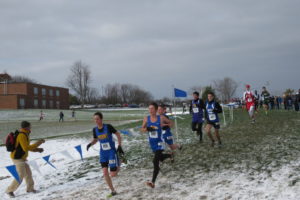
Did your team have any significant injuries this season?
This season we only had 3 cross country-related injuries which were significant enough such that runners had to miss races. One was a mild hamstring strain, and another athlete sprained his ankle twice while racing, once on the first race of the season (stepped on a rock), and again at the State Championship (sprained same ankle while running on frozen mud). Also worth mentioning was that there were no complaints of shin splints whatsoever.
This injury report needs to be interpreted with a healthy dose of caution however, as aside from 2014, where two runners had season-ending lower extremity stress fractures, our team has historically had very low rates of injuries since it started in 2012.
How did the team perform?
The performance of our runners was much better than expected this year. We had anticipated an “off-year” this past season as we lost all but one of our varsity team from last year, but the younger runners improved dramatically and exceeded our expectations by a wide margin. Even though our overall performance did not match that of last year, due to a drop in the performance of some of the other teams in our class, we were able to win the State Championship in Class C here in New York State, which we have not done before.
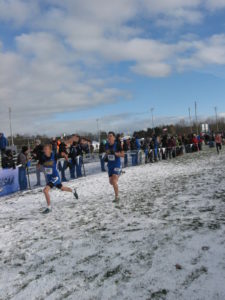
Is there any wider message you wish to share?
I think it is important that kids grow up barefoot or in minimalist shoes, so they don’t lose their natural form. I think a lot of runners don’t get close to their potential because they are running incorrectly, and also put themselves at increased risk for injury. Having runners transition from conventional shoes to minimalist shoes does have some inherent risk as conventional shoes protect and thus weaken the foot, so complete avoidance of conventional footwear is far preferable.
You visited Dr Davis’ lab as Harvard. What important insights came out of that meeting?
Most importantly, I am reassured that I am not crazy in my ideas about the harmful effects of conventional footwear. Often I talk to colleagues about the effects of footwear on our health, and they look at me with a glazed expression that tells me they have no understanding of the topic. It was also a privilege to tour her lab and see the great work she and her colleagues at Harvard are doing!
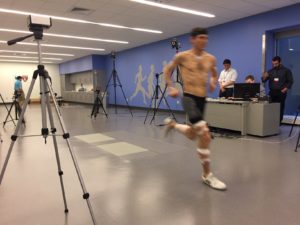
Any specific areas in medicine you would like to see the establishment rethink and take a different approach?
If I could get one thing to change it would be “Footwear’s Null Hypothesis”. At present, the null hypothesis in mainstream medicine is that conventional shoes are best for human health, and departure from this “norm” can only take place if there is reliable scientific evidence to suggest otherwise. I think the establishment needs to reconsider this, and advise patients to stay away from conventional shoes unless reliable evidence becomes available to suggest that conventional shoes are safe.
Any team goals for 2018?
The goals of the team and coaching staff is certainly to have another solid season and perhaps capture another State title, even though this will be made more difficult by the fact that the Mount may move up to Class B for next season. My primary goal as team physician would be to have an injury-free season and see more of our runners running with Natural Form as a result of the fact that they are no longer training in conventional running shoes. With a bit of luck, maybe both will happen!!
Jake we at the NRC thank you for your courage to make change and wishing you a great 2018!


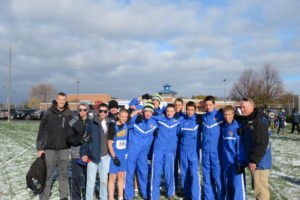
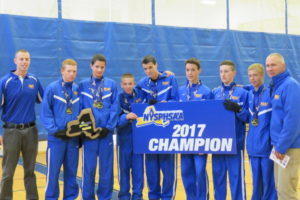
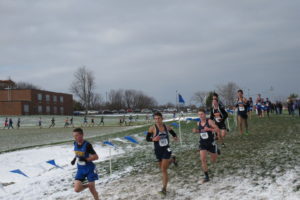
Hello, I am 54 and have been running for 8 years. I tried minimal shoes a few years ago. I eased into them for 6 months and my feet did nothing but hurt. I developed plantar fasciitis and I fought that on and off in both feet. I went to a podiatrist and was told to stop running. Instead of stopping I bought some Asics Gel Nimbus shoes. These are the absolute opposite of minimalist shoes. I am now on my third pair of these shoes and I am running pain free. Is there something about me that is different? I have normal arches and a normal gate. I land with my feet under my body. I run most of my runs easy and when I run hills or intervals I run on a treadmill. I am now 54. Could my weight be causing the minimalist pain. I am 35 pounds heavier than I should be.
Tom running pain free is the goal and if the Asics helping you do that then stay with it 🙂
mixing it up w minimal for walking and other activity is good for foot health
Hello!
I love reading the articles and information on your website. This article is great! I too coach a cross country team in Queen Creek Arizona. We are a smaller charter school but we have a large cross team considering the size of the school. I have wanted to write in about our team for some time. We too highly recommend minimal shoe running to our team and after almost every run we do barefoot strides. We also have interval days on the grass and more than half the team runs the interval or fartlek barefoot. We can report that we rarely have major injuries and our teams our one of the top in our section. We have beat several large schools in large invites as well. We have qualified for and done well in state all 3 years that we have been there. Both my husband and I coach the team and we have been avid minimal shoe runners for years. We love running and coaching. We are grateful for the knowledge you have shared with us. It has been invaluable.
Hayley this is awesome would love to share your story
Mark